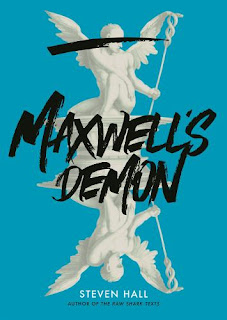Maxwell’s Demon – Steven Hall
The hook is a good one that is irresistible for anyone who is interested in books; Hall creates a great literary mystery around the enigmatic writer of an extraordinary masterpiece of crime fiction, Cupid’s Engine by Andrew Black. More than just a crime novel, Black’s only published work has been met with universal acclaim, popularity and success, but for Tom Quinn the book holds even greater depth and meaning, like some key to understanding the workings of the world, and perhaps even hold the answer to a process that can reverse the inevitable progression of time and entropy that governs the physical world. Or something like that.
Tom is the son of Stanley Quinn, a successful novelist in his time who mentored Andrew Black, and Tom is himself a published author. Although he inevitably feels some disappointment that he may not have lived up to his father’s legacy, his own thriller The QWERTY Machine failing to make a mark, Tom is relatively content to keep writing novelisations of popular TV and film franchises, and he has a great idea for a new Captain Scarlett book. Underneath however, you can tell Tom is restless and it’s not just that his wife has been gone for almost three months on a work project, or the strange phone call he heard on his answer machine or even the fact that the bailiffs could be arriving at the door at any moment. After all these years something about Andrew Black and Cupid’s Engine is still eating away at him.
Although Black has disappeared, never delivering a follow-up to his extraordinary debut novel, one day unexpectedly Tom receives a letter in the post from the enigmatic and reclusive writer, the envelope containing a short note and a Polaroid photograph of a black sphere. Ever the arch manipulator, the intention is evidently to intrigue Tom into responding, and despite the warning of Andrew’s former literary agent Sophie Almonds, Tom can’t resist taking up the challenge, particularly when there is the suggestion that a much anticipated second Andrew Black book might exist That’s when things get very strange…
Essentially, Maxwell’s Demon (or maybe just Tom) rather ambitiously tries to align the qualities of words on a page with scientific principles, evoking the Second Law of Thermodynamics, atoms, molecules, protons, order and entropy, scientific theories and experiments, biblical apocrypha and all manner of philosophical musing on the relationship between words, writing and life. On one or two occasions this descends into typographical and graphical effects on the page (which might not come across quite as well in eBook format, perhaps intentionally considering the context) to evoke the idea of word-atoms and book-engines and all other manner of literary-nature-scientific crossover.
There’s a balance to be struck between making exploring the nature of writing and books, staking some kind of claim to their having something important to communicate in terms of how they help us view the world, and making this entertaining. Maxwell’s Demon seems to want to be (and has no problem self-referentially acknowledging it) Carlos Luis Zafón’s Shadow of the Wind, Dan Brown’s Angels and Demons, John Fowles’ The Magus and with its ideas of an infinite ‘universe between two covers’ of Jorge Luis Borges of The Aleph or The Book of Sand. Accordingly, even though its ideas on the power of the written word are intriguing, the chances of enjoying Maxwell’s Demon as purely an entertaining book are limited by the ambition of putting all that into one book.
If you’re prepared to go along with the bibliophile, bibliological and theological obsessions and footnotes that allude to some grand world-changing apocalyptic conspiracy theory, there are interesting insights to be found in Maxwell’s Demon. You’d need believe however that Andrew Black is some kind of literary genius to be able to get all that into a crime thriller and inevitably Stephen Hall doesn’t make that entirely convincing. Maxwell’s Demon then is by turns fascinating, infuriating, bewildering and absorbing but seemingly unable to reach beyond the literary and philosophical boundaries of what it is grasping for.
While the methodology is unconvincing and the mystery element of the book ultimately unsatisfying and, frankly, incredible, Maxwell’s Demon does I think touch on one fundamental quality of the crossover between literature and life and that’s in the need to find some sort of order and meaning. Some find that in the Bible, some seek to recapture the lost innocence of childhood when the world was much simpler. Do books hold everything together? Or words? Maybe there is something essential in narrative and in the etymology of words that holds everything together – even if it’s just holding onto our sanity – to help us get through troubled and difficult times. I’m not convinced that Maxwell’s Demon has any answers or measures up to its ambitions, but it’s certainly an intriguing and thought-provoking work.




Comments
Post a Comment